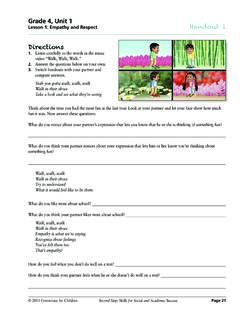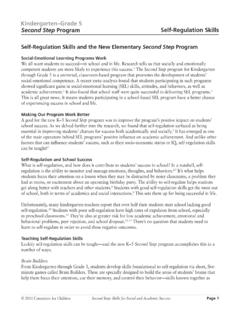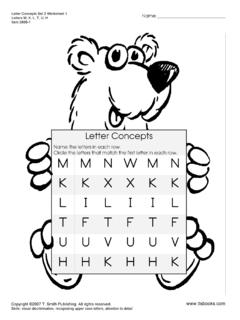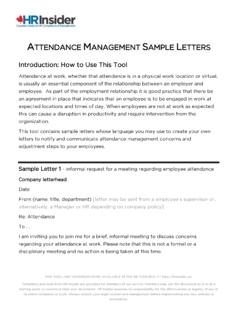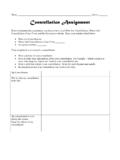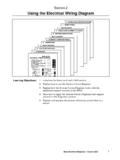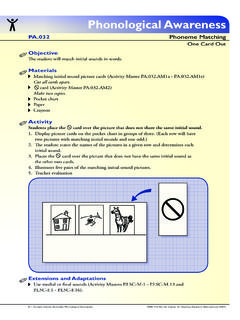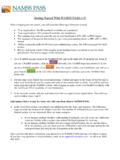Transcription of Name
1 PRINT. Grade 5, Unit 1. Home Link Lesson 1: Empathy and Respect name : Imagine you're a reporter who is reporting on strong emotions and empathy. You've already had a chance to interview a classmate. Now you're going to interview an adult family member using the same questions. Read the selected lyrics from Walk, Walk, Walk and the interview questions out loud to your adult. Record his or her responses for your final report. You see she's getting angry, you've felt that feeling too Describe a time when you've felt really angry: .. What did you do? . Embarrassed, jealous, scared: strong emotions through and through Describe a time when you've felt embarrassed, jealous, or scared.
2 What did you do? . Empathy's the pathway to recognize and walk So you can dish out some compassion and really walk the talk Describe a time when you've helped another person or shown empathy: .. How did that make you feel? .. This homework assignment was completed on |. (DATE) (ADULT SIGNATURE). Page 20 Second Step: Skills for Social and Academic Success 2011 Committee for Children PRINT. Grade 5, Unit 1. Home Link Lesson 2: Listening with Attention name : Do you ever feel like adults just don't listen to you? Or maybe adults feel like you just don't listen to them? It could be that you are both listening you're just not listening with attention!
3 Today you're going to explain to an adult family member the skills used to listen with attention. Then you're both going to practice! These skills can help you communicate better and get along with others. Practice Listening with Attention Tell your adult three things you'd like to do tomorrow. Pay careful attention to the listening-with-attention skills he or she uses while listening to your story. Then check off all the listening-with-attention skills used. Listening-with-Attention Skills Yes Focus on the person's words n Don't interrupt n Ask questions to find out more n Repeat what you heard to show you understand n How did your adult do?
4 If all the skills were not checked off, try it again! Now your adult will tell you three things he or she would like to do tomorrow, then check off your listening-with- attention skills. Listening-with-Attention Skills Yes Focus on the person's words n Don't interrupt n Ask questions to find out more n Repeat what you heard to show you understand n How did you do? . If all the skills were not checked off, try it again! This homework assignment was completed on |. (DATE) (ADULT SIGNATURE). Page 28 Second Step: Skills for Social and Academic Success 2011 Committee for Children PRINT. Grade 5, Unit 1. Home Link Lesson 3: Being Assertive name : It can be scary speaking up or talking to someone you don't know.
5 But with a little practice, it gets easier. With an adult family member, practice asking for help assertively. Pretend your adult is a store clerk. You need to ask for help finding your favorite cereal. First write down what you plan to say, and practice saying it with your adult. Then go to a real store and practice asking a real store clerk for help finding cereal or any other item you might need. Remember to use your Assertiveness Skills! The words I would say to assertively ask a store clerk for help finding my favorite cereal: . Now pretend your adult is the store clerk, and ask. Your adult will check off the Assertiveness Skills in the boxes below as you use them.
6 Assertiveness Skills Yes Face the person you're talking to n Keep your head up and shoulders back n Use a calm, firm voice n Use respectful words n How did you do? If all the skills were not checked off, try it again! The words I would say to assertively ask a store clerk for help finding : . Now go to a real store with your adult. Have your adult observe you while you ask a clerk for help. Remember to use your Assertiveness Skills! Afterward, with your adult, go through the checklist below and check off all the skills you used. Assertiveness Skills Yes Face the person you're talking to n Keep your head up and shoulders back n Use a calm, firm voice n Use respectful words n How did you do?
7 If all the skills were not checked off, try it again! This homework assignment was completed on |. (DATE) (ADULT SIGNATURE). Page 36 Second Step: Skills for Social and Academic Success 2011 Committee for Children PRINT. Grade 5, Unit 1. Home Link Lesson 4: Predicting Feelings name : You don't have to be a wizard or know magic to predict what people are going to do. You just need to know a few tricks. And the tricks all have to do with thinking about how others might feel. With an adult family member, read the list of Predicting Tricks below. Then try out your tricks with your adult to predict how each other might feel in the scenarios listed in the chart.
8 Predicting Tricks Think about what you know about the person. Think about how the action might affect the person. Think about how the person might react. Think about how you might react in the same situation. Student's Predictions Adult's Predictions Your adult found a broken plate in the garbage. Your adult Without asking, you threw out some toys you thought your might feel: student had outgrown. Your student might feel: Your adult has to work late three nights in a row. Your adult Your student worked very hard on a project for school, but still might feel: couldn't finish it. Your student might feel: You cleaned up your room without being asked.
9 Your adult Your student came home and his or her favorite dessert was on might feel: the table. Your student might feel: This homework assignment was completed on |. (DATE) (ADULT SIGNATURE). Page 44 Second Step: Skills for Social and Academic Success 2011 Committee for Children PRINT. Grade 5, Unit 1. Home Link Lesson 5: Taking Others' Perspectives name : What do adults and kids really know about what the other thinks? Let's find out! You and an adult family member are going try understanding each other's perspective. First, answer the questions on the left side of the page. Try to identify the other person's perspective and the reasons he or she has that perspective.
10 When you're done, fold the page in half so your answers can't be seen. Next, have your adult answer the same questions on the right side of the page. Then open the page and compare your answers to find out how well you understand each other's perspective! Student's Perspective Adult's Perspective How many household chores should I do each week? My How many household chores should my student should do perspective is: each week? My perspective is: My reason(s) are: My reason(s) are: I think my adult's perspective is: I think my student's perspective is: I think my adult's reason(s) are: I think my student's reason(s) are: Were you right about each other's perspective?

